

Firms Share The Secret to Creating Great Company Culture. Company culture can make or break an organization.

For employees, it can mean the difference between sticking it out in a role for a year before flying the coop or spending a career growing and developing with the company. For managers, it can mean the difference between constantly scrambling to fill roles or address complaints and having the choicest pick of talent approaching them for a position. No longer is the promise of a stable job and a gold watch upon retirement enough to satisfy today’s millennial-heavy workplace.
What Google Learned From Its Quest to Build the Perfect Team. So Rozovsky started looking for other groups she could join.

A classmate mentioned that some students were putting together teams for ‘‘case competitions,’’ contests in which participants proposed solutions to real-world business problems that were evaluated by judges, who awarded trophies and cash. The competitions were voluntary, but the work wasn’t all that different from what Rozovsky did with her study group: conducting lots of research and financial analyses, writing reports and giving presentations. The members of her case-competition team had a variety of professional experiences: Army officer, researcher at a think tank, director of a health-education nonprofit organization and consultant to a refugee program.
Despite their disparate backgrounds, however, everyone clicked. Rise of the chief culture officer. What does it mean that "top managers say culture is the most important issue ... How Company Culture Shapes Employee Motivation. Just Culture resources. Business: What are telltale signs that you're working at a "sinking ship" com... The Five Elements Of A 'Simply Irresistible' Organization.
Culture handbooks from the world's most culture-centric companies. Signs Your Company Suffers From a Toxic Culture. Safety. Accountability. Organizational Agility. Employee Engagement. Remote working. Diversity & Inclusion. Corporate vs Functional Culture. Commitment to an organization-wide ethos feels increasingly antiquated.
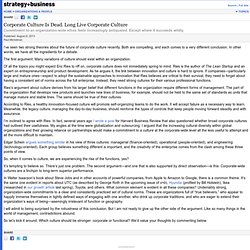
Except where it succeeds wildly. I’ve seen two strong theories about the future of corporate culture recently. Both are compelling, and each comes to a very different conclusion. In other words, we have all the ingredients for a debate. The first argument: Many variations of culture should exist within an organization. Of all the topics you might expect Eric Ries to riff on, corporate culture does not immediately spring to mind. Ries’s argument about culture derives from his larger belief that different functions in the organization require different forms of management.
According to Ries, a healthy innovation-focused culture will promote self-organizing teams to do the work. I’m inclined to agree with Ries. Businesses With A Strong Sense Of Purpose Are More Successful. You may have already sensed that companies with a clear sense of purpose do better than those without one.
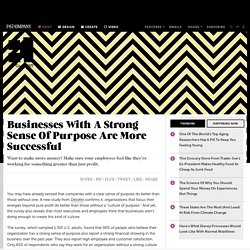
A new study from Deloitte confirms it: organizations that focus their energies beyond pure profit do better than those without a "culture of purpose. " And yet, the survey also reveals that most executives and employees think that businesses aren’t doing enough to create this kind of culture. The survey, which sampled 1,310 U.S. adults, found that 90% of people who believe their organization has a strong sense of purpose also report a strong financial showing in the business over the past year. They also report high employee and customer satisfaction. The Method Method Of Creating And Nurturing Amazing Corporate Culture. Like the age-old riddle about silence--which expires the moment you say its name--culture defies cultivation.

The latest HR theories can no more measure a company's culture than an MRI can isolate an individual's soul. No drab mission statement ever inspired anyone to put in extra hours on a side project, no weekend team-building exercise in the forest ever got executives and hourly workers to sit side by side at lunch on Monday, and the world has yet to see an employee handbook capable of boosting employee morale.
The greater the effort to formalize it--to box it in with structure and guidelines--the faster culture slips away. Nevertheless, diligent HR pros devote dense manuals full of prescriptive theory to its creation, only to throw up their hands, exasperated, when it materializes spontaneously in the ranks of unassuming start-ups all around them. Lousy Hires = Lousy Culture. Go Figure. One reason I get a kick out of reading business books is because their themes frequently come to life and smack you right in the nose at work the next day.
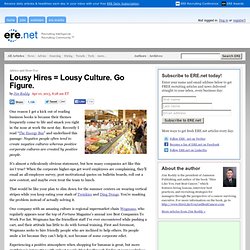
Recently I read “The Energy Bus” and underlined this passage: Negative people often tend to create negative cultures whereas positive corporate cultures are created by positive people. It’s almost a ridiculously obvious statement, but how many companies act like this isn’t true? When the corporate higher-ups get word employees are complaining, they’ll email an all-employee survey, post motivational quotes on bulletin boards, roll out a new contest, and maybe even treat the team to lunch.
That would be like your plan to slim down for the summer centers on wearing vertical stripes while you keep eating your stash of Twinkies and Ding Dongs. You’re masking the problem instead of actually solving it. The 6 Secrets Of America's Happiest Workplaces. What makes a company a best place to work?
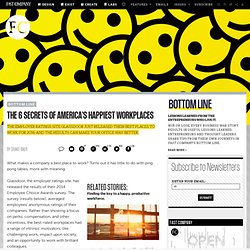
Turns out it has little to do with ping pong tables, more with meaning. Glassdoor, the employer ratings site, has released the results of their 2014 Employee Choice Awards survey. Forget The Mission Statement. What's Your Mission Question? In a previous article, I shared five questions that today’s forward-thinking companies should be asking, based on input from top business consultants.
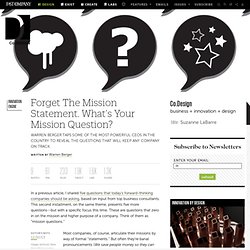
This second installment, on the same theme, presents five more questions--but with a specific focus this time. These are questions that zero in on the mission and higher purpose of a company. Think of them as “mission questions.” Most companies, of course, articulate their missions by way of formal “statements.” But often they’re banal pronouncements (We save people money so they can live better. Questions, on the other hand, can provide a reality check on whether or not a business is staying true to what it stands for and aims to achieve. 1. Over time, companies can lose sight of what they first set out to do.
But what helps guide the company at all times is the knowledge that “we arose out of our love of nature and the wilderness,” as Sheahan puts it. 2. 3. 4. 5. [ILLUSTRATIONS: Questions via Shutterstock] Does Netflix's culture deck reflect reality? Culture Code: Creating A Lovable Company. Jeff Bezos and Amazon. Jeff Bezos Highlights by David Willden Amazon is one the top five most admired companies in the world.

It was founded in 1994. In 2009 its revenue was $24.5 billion, and its gross income was $902 million. 10 Glaring Signs Your Company is on the Fast Track to Obsolescence.